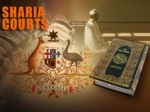25 August 2011
Egypt’s Brotherhood Declares War on the Bikini
 More zealous Muslims demand cover-up of pharaonic monuments, too Sunbathing in Alexandria may soon be a thing of the past, at least if some Egyptian Islamist politicians have their way.
More zealous Muslims demand cover-up of pharaonic monuments, too Sunbathing in Alexandria may soon be a thing of the past, at least if some Egyptian Islamist politicians have their way.
Egypt's tourism industry has suffered a severe blow since the outburst of anti-regime demonstrations in January. But that did not stop the Freedom and Justice Party, the political wing of the Muslim Brotherhood, from demanding stricter regulations over what tourists can do and wear while visiting the country. The party is urging officials to ban skimpy swimwear and the consumption of alcohol on Egyptian streets.
"Beach tourism must take the values and norms of our society into account," Muhammad Saad Al-Katatny, secretary-general of Freedom and Justice, told Egyptian tourism officials on Monday. "We must place regulations on tourists wishing to visit Egypt, which we will announce in advance."
The call for new strictures on tourists comes as Egypt debates the role of Islam in the post-Mubarak era. Freedom and Justice is competing in elections scheduled for this autumn for parliament and opinion polls show a majority of Egyptians favor a greater use of Islamic law and mores. But a vocal minority worries that Egypt risks becoming an Islamic republic.
"This is how things began in Iran," Hani Henry, a psychology professor at the American University in Cairo, told The Media Line. "The moderate youth wanted to implement changes, but the Mullah's hijacked the revolution. The same thing is now happening here in Egypt with the Muslim Brotherhood. It makes me sick to my stomach."
Along with Suez Canal tolls and energy exports, tourism is a major source of foreign exchange for Egypt. But with protests, strikes, and continued violence in the cities and Sinai Peninsula months after President Husni Mubarak was forced to step down, foreigners have hesitated to visit the country, which offers some of the world’s most spectacular antiquities as well as beaches and scuba diving.
Finance Minister Hazem Al-Beblawi told the Reuters news agency earlier this month that revenue from tourism would likely total $10 billion in the financial year that started on July 1, compared with $11.6 billion in 2009/10.
Al-Katatny told Al-Masry Al-Youm daily that his party had already set up a subcommittee to investigate the issue of incoming tourism to Egypt and planned to amend legislation following the upcoming parliamentary elections.
"Some slight changes will be made in public beaches, to make the situation better than it was before," Ali Khafagy, youth director of Freedom and Justice in Giza, told The Media Line. "Bathing suits and mixing on the beach are things that go against our tradition. It's not just a matter of religion. When I go to the beach I don't want to see nudity."
He said modest bathing gear or separate beaches for men and women are possible alternatives to the current situation.
Khafagy stressed that tourists would be free to do as they please in specially designated areas, adding that his party supported incoming tourism to the country. But that did not satisfy the heads of Egypt's tourism industry, who met with the party’s secretary-general Al-Katatny for a heated debate on Monday.
"Without alcohol and bathing suits, no tourists will come and we will loose $13 billion a year," Hussam A-Shaer, head of the tourist company association, told Al-Masry al-Youm.
But bathing suits are not the only worry of Egypt’s Islamists. Abd Al-Munim A-Shahhat, a spokesman for the Salafi group Dawa, has said that Egypt's world-renowned pharaonic archeology – its pyramids, Sphinx and other monuments covered with un-Islamic imagery – should also be hidden from the public eye.
"The pharaonic culture is a rotten culture," A-Shahhat told the London-based Arab daily A-Sharq Al-Awsat on Wednesday, saying the faces of ancient statues "should be covered with wax, since they are religiously forbidden." He likened the Egyptian relics to the idols which circled the walls of Mecca in pre-Islamic times.
The Islamist challenges to the tourism industry in post-revolutionary Egypt have led to the establishment of the Coalition to Support Tourism, whose members also met with Al-Katatny on Monday. The coalition, which includes a broad array of travel industry organizations and figures, argued that the real problem isn’t modesty but the absence of any strategy on the part of Egypt's new parties to protect the country's faltering tourism industry.
"Some parties want to ban tourism, or allow it while banning alcohol, certain foods and certain clothes. [A couple] renting a room will require documents proving they are married," wrote the coalition administrator on the group's Facebook page. "These proposals don’t bode well, as many of you know."
Henry of the American University said two classes of beaches already exist in Egypt, with modestly dressed, generally poor Egyptians occupying some and foreign tourists occupying others, mostly in the resorts of the Sinai Peninsula. He said he considered imposition of sharia law in Egypt "an act of aggression" that he would not tolerate.
Islamists have never been enamored of foreign tourism and before they were crushed by the Mubarak regime foreign visitors were often targeted for killings. Close to 60 Western tourists were killed by Islamist terrorists in the southern city of Luxor in 1997. Tourists were also attacked in bombings in the Sinai resorts of Taba, Sharm Al-Sheikh and Dahab in 2004, 2005 and 2006.
But Al-Kantatny said that the Muslim Brotherhood regards Egypt's archeology as belonging to all of humanity, and should therefore be safeguarded.
"This heritage belongs to everyone, and one can't simply remove something he doesn't like," he told Al-Ahram daily.
14:58 Posted in Egypt | Permalink | Comments (0) | ![]() Facebook |
Facebook |



















The comments are closed.